
Қар . 30, 2024 03:12 Back to list
Understanding Chicken Coccidiosis and Its Impact on Poultry Health and Production
Understanding Coccidiosis in Chickens A Comprehensive Overview
Coccidiosis is a significant disease affecting poultry, particularly chickens, caused by single-celled parasites known as coccidia. These protists inhabit the intestinal tract of chickens and lead to severe health challenges, impacting the overall productivity and growth of poultry. Understanding coccidiosis is vital for poultry farmers, as it presents a risk not only to individual flock health but also to the economic viability of poultry farming operations.
What is Coccidiosis?
Coccidiosis is caused by various species of the genus Eimeria. In chickens, the most common species include *Eimeria tenella*, *Eimeria necatrix*, *Eimeria acervulina*, and *Eimeria maxima*. These parasites invade the epithelial cells of the intestines, leading to tissue damage and inflammation. The severity of the disease can vary based on factors such as the age of the chickens, the specific Eimeria species involved, and the overall health and management practices of the flock.
Life Cycle of Coccidia
The life cycle of coccidia involves both sexual and asexual reproduction. The process begins when chickens ingest oocysts (the infective stage) from contaminated feed, water, or environments. Once ingested, the oocysts hatch in the intestines, releasing sporozoites that invade intestinal cells, where they multiply and cause significant damage. As the infected cells rupture, new oocysts are released into the environment through the chicken's feces, continuing the lifecycle and increasing the risk of infection for other birds.
Symptoms of Coccidiosis
Chickens infected with coccidia exhibit a range of symptoms. Early signs include lethargy, loss of appetite, and weight loss. As the disease progresses, more severe symptoms develop, including diarrhea, which may be bloody in cases of severe infection. Infected chickens may also experience dehydration, weakness, and ultimately death if not treated promptly. The clinical signs can vary significantly depending on the species of coccidia involved and the intensity of the infection.
Diagnosis and Treatment
Diagnosing coccidiosis typically involves veterinary examination, fecal sample analysis, and identification of oocysts under a microscope. Once diagnosed, treatment options include the use of anticoccidial medications, such as ionophores or sulfonamides. These medications help to inhibit the growth of coccidia and alleviate the symptoms of the disease.
custom chicken disease coccidiosis

In addition to pharmaceutical interventions, supportive care is crucial. Ensuring that affected birds have access to clean water and a balanced diet is essential for recovery. In severe cases, veterinarians may recommend additional therapies, including electrolytes and vitamins, to aid in hydration and recovery.
Prevention Strategies
Preventing coccidiosis is more effective than treating it after infection. Key strategies for preventing the disease include
1. Good Hygiene Practices Regular cleaning and sanitation of chicken housing, equipment, and feeding areas can reduce the likelihood of coccidia transmission.
2. Proper Nutrition Ensuring that chickens receive a balanced and nutritious diet strengthens their immune systems, making them less susceptible to infections.
3. Vaccination In some cases, coccidiosis vaccines can be administered to provide immunity to poultry flocks, although this is not universally practiced.
4. Avoiding Overcrowding Providing adequate space for birds reduces stress and minimizes the spread of infections within the flock.
5. Rotation of Pastures If chickens are raised on pasture, rotating them to different areas can help break the lifecycle of coccidia.
Conclusion
Coccidiosis poses a significant challenge to chicken health and the poultry industry at large. By understanding its causes, symptoms, and treatment options, farmers can implement effective management strategies to control the spread of this disease. Prevention through proper hygiene, nutrition, and management practices is key to maintaining a healthy flock and ensuring successful poultry production. With appropriate knowledge and resources, poultry farmers can mitigate the impact of coccidiosis and contribute to the sustainability of their operations.
-
Quality Bacillus Coagulans BC30 Factory - Expert Production
NewsAug.02,2025
-
China Salivation AI with GPT-4 Turbo Features
NewsAug.01,2025
-
Epic Sepsis Factories: AI-Driven Detection with GPT-4 Turbo
NewsJul.31,2025
-
Acute Salpingitis and Oophoritis AI Factory
NewsJul.31,2025
-
Premium China Bacillus Subtilis Supplier & Factory Solutions
NewsJul.30,2025
-
Premium Avermectin Supplier in China | Custom Solutions Available
NewsJul.29,2025




